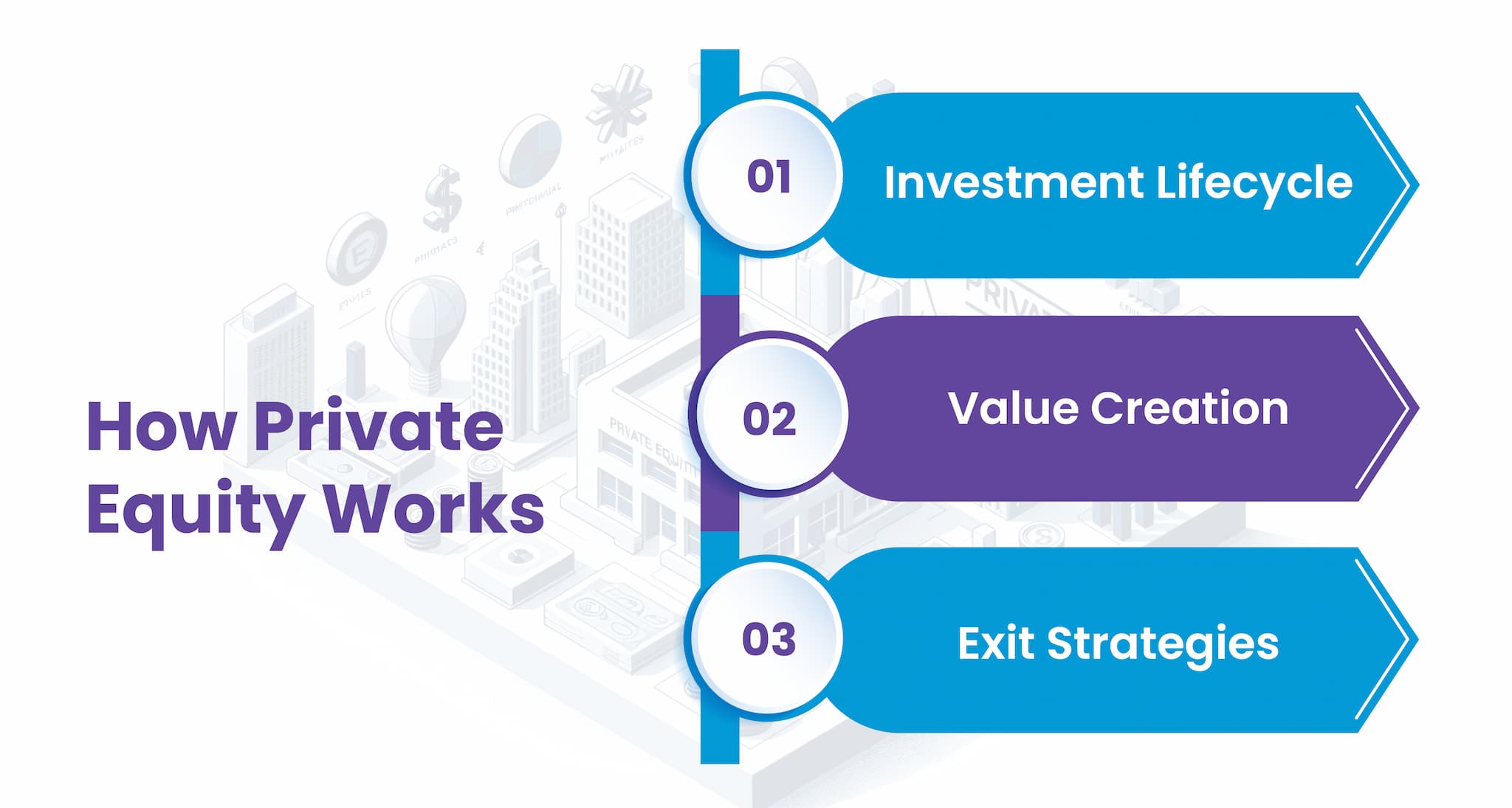In this post we will discuss private equity deals in general and how a private equity data room can help in securing these transactions.
Definition and Basics
Capital Source
Private equity firms raise funds from high-net-worth individuals, pension funds, endowments, insurance companies, and other institutional investors.
Investment Focus
These funds are typically used to invest in private companies, or to buy out public companies and delist them from public stock exchanges (a process known as a leveraged buyout, or LBO).
Ownership Stakes
Private equity investors often buy majority or significant minority stakes in companies, giving them substantial control over the company's operations.
Types of Private Equity Investments
Leveraged Buyouts (LBOs)
In an LBO, a private equity firm uses a significant amount of borrowed money to meet the cost of acquisition. The assets of the company being acquired usually serve as collateral for the loans.
Growth Capital
This involves investing in mature companies that require capital to expand or restructure operations, enter new markets, or finance a significant acquisition without a change of control of the business.
Venture Capital
This is a subset of private equity that focuses on investing in startups and early-stage companies with high growth potential.
Distressed Investments
These are investments in companies facing financial or operational difficulties, often involving restructuring or bankruptcy.
How Private Equity Works

Investment Lifecycle
Private equity investments typically have a longer lifecycle than public market investments. Private equity firms aim to improve the performance of a portfolio company and then sell it after a period, typically 4-7 years, for a significant profit.
Value Creation
Strategies for adding value include streamlining operations, cutting costs, expanding into new markets, and improving management and business strategies.
Exit Strategies
The ultimate goal of a private equity firm is to realize a return on its investment, typically through one of the following exit strategies: an initial public offering (IPO), a sale to another private equity firm (secondary buyout), or a sale to a large corporation (strategic acquisition).
Security Concerns In Private Equity Transactions

Private equity transactions involve several specific security concerns due to the nature of the data and the amount of capital involved. These concerns are primarily centered around the protection of sensitive information and ensuring the integrity of the transaction process.
Here are some key security concerns:
Data Breach and Leakage
The most significant concern is the unauthorized access to confidential information. This includes financial records, business strategies, client data, and intellectual property. Data breaches can occur through hacking, insider threats, or accidental exposure.
Compliance and Regulatory Risks
Private equity firms are subject to a variety of regulations, such as GDPR in Europe or SEC regulations in the U.S. Non-compliance with these regulations, especially in handling sensitive data, can lead to legal penalties and loss of reputation.
Due Diligence Integrity
During the due diligence process, a vast amount of sensitive information is shared and reviewed. Ensuring that only authorized parties have access to relevant documents and that the integrity of these documents is maintained is crucial.
Insider Threats
The risk posed by individuals within an organization, such as employees or partners who might misuse their access to sensitive information for personal gain or sabotage, is a significant concern.
Third-party Risk Management
Private equity transactions often involve multiple third parties, such as legal advisors, accountants, and consultants. Ensuring that these parties adhere to the same security standards and confidentiality agreements is vital to safeguard data.
Communication Security
Secure communication channels are necessary to protect the information exchanged between parties involved in a transaction. Unsecured channels can be susceptible to eavesdropping or interception.
Deal Secrecy and Information Silos
Maintaining the confidentiality of the deal itself is often critical, as premature information leaks can affect market dynamics, valuation, and negotiation positions.
Financial Fraud
There is a risk of fraudulent activities, such as manipulation of financial statements or embezzlement, which can be facilitated by inadequate security measures.
Cybersecurity Threats
General cybersecurity threats, such as malware, ransomware, phishing attacks, and other forms of cyberattacks, pose a constant risk.
How A Private Equity Data Room Can Help
Security and Confidentiality
In an era where data breaches are common, the security offered by virtual data rooms is non-negotiable. They provide robust encryption, user authentication, and access controls to ensure that sensitive information remains confidential.
Efficiency and Accessibility
Virtual data rooms facilitate quick and easy access to documents, regardless of geographical constraints. This expedites due diligence, allowing stakeholders to review documents without the need for physical meetings or shipping of sensitive material.
Organizational Advantage
These platforms offer superior organizational tools, allowing for easy categorization, tagging, and indexing of documents. This organization is critical in speeding up the due diligence process and making it more thorough.
Real-time Updates and Tracking
Stakeholders can receive real-time updates and notifications regarding document changes or additions. This feature ensures that all parties are on the same page, reducing the likelihood of misunderstandings or outdated information.
The Role of ShareVault in Enhancing Private Equity Data Rooms

ShareVault steps into this ecosystem with features tailored to the unique needs of private equity transactions. It amplifies the benefits of a standard virtual data room by offering:
Advanced Security Features
ShareVault's security protocols go beyond industry standards to ensure that your most sensitive data is protected against all forms of digital threats.
Intuitive User Experience
With a focus on user-friendly design, ShareVault ensures that all parties can navigate the data room effortlessly, regardless of their tech-savviness.
Enhanced Due Diligence Tools
ShareVault facilitates a more streamlined due diligence process with tools that allow for effective communication, document tracking, and analysis within the data room.
Customizable Access Controls
ShareVault understands that not all data is meant for all eyes. Its customizable access controls ensure that information is only seen by authorized individuals.
24/7 Customer Support
Recognizing the non-stop nature of private equity deals, ShareVault offers round-the-clock customer support by industry experts to address any issues promptly.
Conclusion
In summary, private equity data rooms, especially when powered by platforms like ShareVault, represent a crucial tool in modern deal-making. They not only protect and organize critical information but also streamline the deal process, making transactions faster, more secure, and more efficient.
In an age where data drives decisions, a well-structured virtual data room is not just a convenience; it's a necessity.

